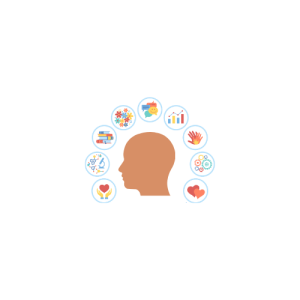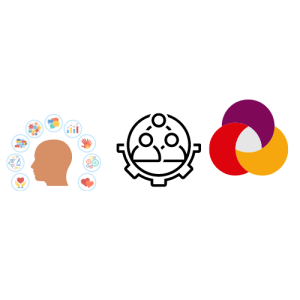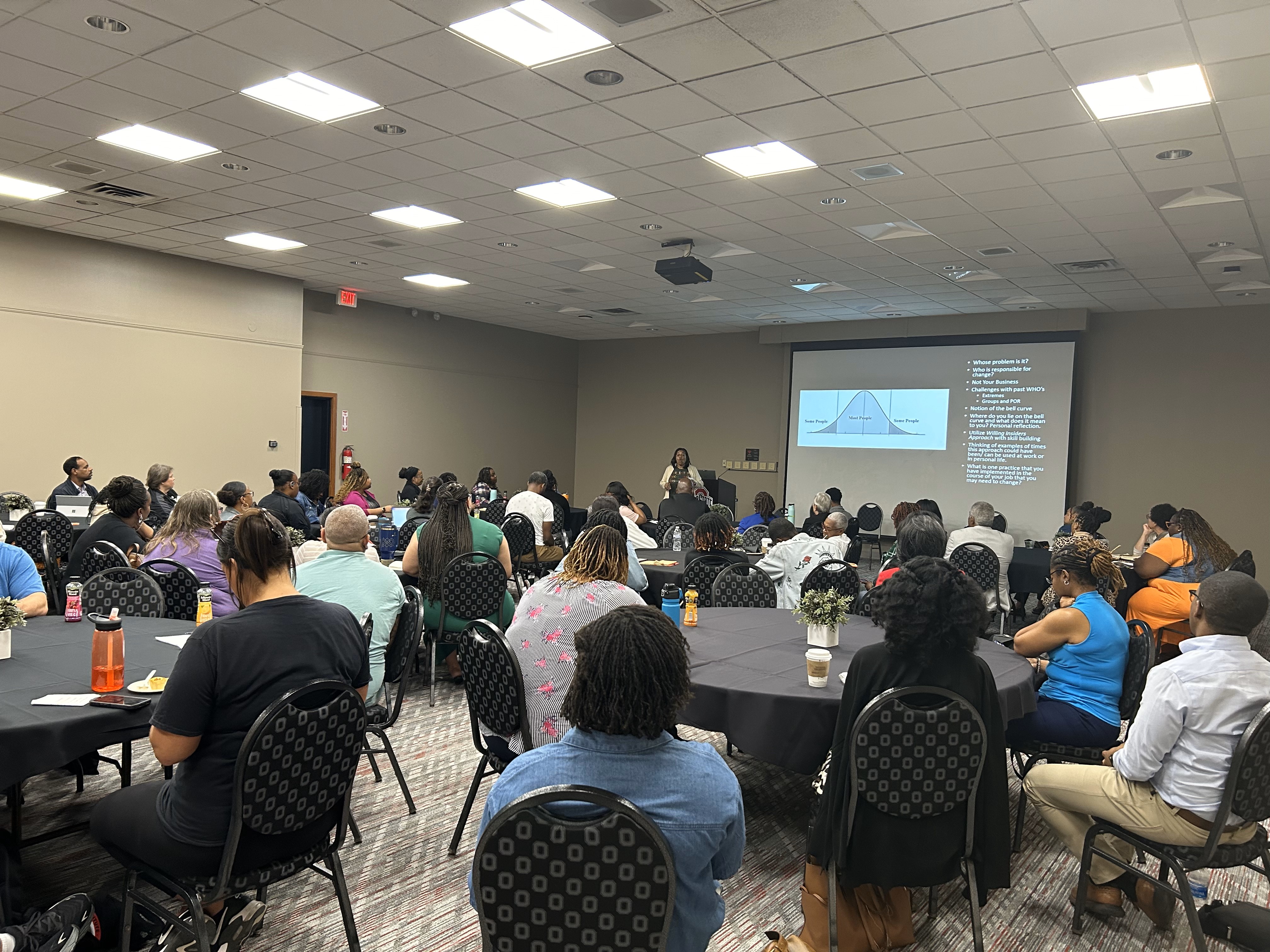African American Behavior Health Conference
Date: July 25-26, 2024.
Location: Fawcett Center. 2400 Olentangy River Rd, Columbus, Ohio 43210
Co-sponsored by the Ohio Department of Mental Health and Addiction Services, the Kirwan Institute for the Study of Race and Ethnicity, and the OSU Office of Outreach and Engagement, the conference will engage scholars and practitioners in conversation regarding the latest research and clinical practices to support the African American community in Ohio.
Preliminary Schedule
See below for the preliminary conference schedule
Key Themes of the Conference
Needs of Specific Populations -

2. Upstream Considerations

3. Workforce Development

4. Broad Behavioral Health Phenomena

Thursday, July 25th
Franklin/Hamilton (50/80) |
Hancock (50/80) |
Clinton (100) | Delaware Room (30) - Utilized for Healing Spaces
| |
8:15 - 8:45 am | BREAKFAST | |||
8:45 - 9:00 am | Welcome - Joseph Hill (Ohio Department of Mental Health and Addiction Services) Dr. Wendy Smooth (the Ohio State University) Dr. Ange-Marie Hancock (The Kirwan Institute for the Studies of Race and Ethnicity) Invocation by Bishop Bellinger (NAMI FC Faith Link ) | |||
9:15 - 10:45 am | 
Culturally Competent Mental Health Professionals: Sub-Saharan Nations Mental Health & Addiction Services - Liban Bule AbstractLength: 75 Minutes Overview: This crucial session will discuss the impact of drug and alcohol abuse on the Somali community. Participants will delve into the alarming rates of addiction, exploring its root causes and effects. Together, participants will brainstorm actionable solutions and strategies to support those affected and foster positive change within the community. Speaker: I'm Liban Bule, a Somali immigrant who began my journey as a translator, facilitating communication and understanding across cultural boundaries. However, my path took a profound turn when I encountered the devastating impact of drug and alcohol addiction within the Somali community. Driven by a deep sense of responsibility and empathy, I transitioned my focus towards addressing these pressing issues. Witnessing the struggles and challenges faced by my fellow community members, I felt compelled to take action. Drawing upon my linguistic skills and cultural insight, I embarked on a mission to provide support, guidance, and resources to those in need. My work goes beyond mere assistance; it embodies a commitment to fostering empowerment and resilience within the community. Through advocacy, education, and collaboration, I strive to create a supportive environment where individuals can find hope, healing, and a sense of belonging.Every day, I am inspired by the strength and resilience of the Somali immigrant community. Together, we stand united in our efforts to overcome adversity and build a brighter future for ourselves and future generations. Objectives:
| 
Here Us Now - Black Families of Children With Special Needs - Cassandra Archie AbstractLength: 75 minutes Overview: The behavioral health field must have a collective understanding of the needs, experience and expertise of Black families whose children have special needs, and the impact of disability on the emotions, behaviors and self-concept of not only the child, but the parent as well as the family. Speaker: Cassandra Archie is the founder of Advocates for Educational Equity & Excellence, LLC, better known as Advocates. Advocates works with families, to provide parents the tools, resources and supports to navigate the general education and special education systems for better educational outcomes for their child. Mrs. Archie believes every parent wants the best education for their child. How to support parents in getting the best education for their child, is what Advocates is in the business of doing. Her commitment to families and the education of their children, is a life-long journey for her. As a trained mediator, and a former (OSEP) Office of Special Education and Programs Parent Training and Information Center Director, Mrs. Archie is on the ground, and in communities understanding what parents want and need, and in the room, at the table, knowing how schools and educational systems work. Mrs. Archie co-authored the National Center for Learning Disabilities Parent Handbook on the Individuals with Disabilities Improvement Act, the New York State sourcebook, Educating Children Together, and the U.S Department of Health and Human Services, Educational Interventions for Children Affected by Lead. Objectives
| 
Understanding structural racism and inequities in the behavioral health system- creating Equitable Advancement of Support for Everyone (E.A.S.E) - Julie Radlauer AbstractLength: 75 minutes Overview: Equitable Advancement of Support for Everyone (EASE) stems from research with African American families of children with mental health challenges. The results of the study resulted in a historical review of the development of the behavioral health system and why it results in inequitable outcomes. Additionally, families reported that they prefer informal support rather than formal treatment services. Currently EASE is taught at the national level and used to train behavioral health professionals on the development of the behavioral health system, how that system perpetuates inequities, and how to engage families differently to get better outcomes. Speaker: Dr. Radlauer-Doerfler is a leading expert in the social influences of mental health and uses her experience to create impact within communities, systems, organizations, and individuals. Her approach is collaborative, creative, and curious as she strives to educate utilizing unique avenues including media, stage production, video production, podcasting and writing. She has extensive experience in behavioral health, public health, and organizational development for more than 25 years. She speaks internationally and participated as a TEDx Miami speaker on social support, and social connectedness. Her research on structural racism in the behavioral health field has led to the development of a national curriculum designed to create more equitable systems. She is passionate about addressing behavioral health challenges in communities and speaks widely on the topic. Objectives
|
Aromatherapy |
10:45 - 11:00am | BREAK | |||
11:00 - 12:15 pm | 
Addressing Alzheimer's Disease and Promoting Brain Health in Black Communities - Jeremy Grant & Erika Pugh AbstractLength: 75 minutes Overview: Diagnostic disparities in attention-deficit/hyperactivity disorder (ADHD) and disruptive behavior disorders among ethnic and racial minority youth persist despite controlling for confounding variables. Unconscious biases among clinicians may contribute to these disparities, leading to differential judgments and interpretations of behaviors. This commentary highlights the implications of such biases on diagnostic accuracy and access to essential services for ethnic and racial minority youth, emphasizing the importance of addressing unconscious bias in academic psychiatry. Recommendations for mitigating bias and promoting equitable diagnostic practices are discussed, aiming to reduce disparities in medical, educational, and juvenile justice systems. Speaker: Jeremy Grant, Ph.D., is currently a postdoctoral fellow in clinical neuropsychology at the University of Florida and will be starting a faculty position in the Department of Psychology at The Ohio State University in Fall 2024. His research examines as modifiable risk factors for age-related cognitive decline (cognitive reserve/resilience, cardiometabolic disease, neighborhood disadvantage) and non-pharmacological interventions to promote brain health, particularly among Black older adults. He obtained a B.S. in Biology from Andrews University, an M.Sc. in Neuroscience from Carleton University, followed by an M.A. and Ph.D. in Clinical Psychology from Wayne State University. He completed his predoctoral internship in clinical psychology at the University of Florida, where he stayed for a postdoctoral fellowship funded by the Florida Department of Health Ed & Ethel Moore Alzheimer's Disease Research Program. He is a member of the National Institute on Aging's (NIA) Butler-Williams Scholars Program and the Alzheimer's Disease Neuroimaging Initiative (ADNI) Health Equity Scholars Program, and is a co-leader of the Society for Black Neuropsychology (SBN) Mentorship Program. Erika Pugh, Ph.D., is a postdoctoral fellow in the Department of Psychology at The Ohio State University. Her research interests include examining factors underlying ethnoracial disparities in cognitive aging, evaluating early markers of cognitive decline, lifestyle interventions for early cognitive decline. Objective:
| 
The Intersecting Crisis of Black Mental Health, Racial Trauma, and COVID-19: Lessons from Black Clinicians - Chante Meadows AbstractLength: 75 minutes Overview: This presentation discusses the experiences of Black clinicians in delivering mental health care during the COVID-19 pandemic with its accompanying mental health crises and the documented and highly publicized emergence of racial crises tied to extrajudicial violence and over-policing. Before the pandemic, the Black community already had a high need for mental health treatment services, but it only worsened with never-ending racial tension and COVID-19. As professionals, many Black mental health clinicians had to navigate the increased and complex demands for services because of these multiple traumas while also navigating their personal feelings, trauma, and losses. Speaker: Dr. Chante Meadows (she/her) is the Founder and CEO of Meadows Counseling Group. Dr. Meadows holds a doctorate degree in Leadership and Change and is a licensed clinical social worker with an emphasis in mental health. Meadows Counseling group is a group practice of about 10 mental health clinicians specializing in culture, diversity, trauma, and many other specializations. As a therapist specializes in working with BIPOC, women’s issues, relationship issues, life transitions, college counseling, couples counseling, anxiety, and depression. She works from a collaborative and person-centered approach, integrating theories and techniques from a variety of therapies. She holds certificates in sex therapy and EMDR (trauma therapy). She is a Lecturer in the College of Social Work at The Ohio State University. Chante currently serves as the Board of Directors President of the National Association of Social Work, Ohio Chapter. Chante is a speaker, educator, and has a TEDx regarding mental health stigma. Her passion is spreading the word about mental health and defeating stigma. Dr. Meadows is married and has four sons; the youngest two are twins. Objectives:
| 
Making the Invisible Visible: Understanding the Challenges, Needs, & Barriers of Communities of Color in Appalachia when accessing the healthcare system - Brandi Baker & Amanda Flowers AbstractLength: 75 Minutes Overview: This presentation will highlight the process of coordinating a community participatory assessment for healthcare access among people of color in Appalachia. Participants will learn about how we organized and facilitated a community-directed process in partnership and collaboration with local health organizations. This session will highlight the importance of building relationships, trust, patience, and understanding cross cultural history and present dynamics within diverse townships. Participants will learn the outcomes of the assessment and recommended approaches for improving healthcare practices, services, and resources within the healthcare system for people of color in Appalachia. This presentation will address illuminate the voices and experiences of communities of color in southeast Ohio while providing community recommendations on equitable approaches to healthcare and the workforce community within Appalachia. Speakers: Brandi Baker is the Co-Founder of the Racial Equity Coalition of Athens County (RECAC), a community organization that was founded in southeast, Ohio in 2018. Brandi is a first-generation college student born and raised in Cleveland, OH and a two-time alum of Ohio University with a bachelor’s in communications and a master’s in public administration. Brandi is a Certified Diversity Professional (CDP) with over 15 years’ experience leading, developing, and managing access, diversity, equity and inclusion education and workforce programs, trainings and pipelines within higher education, non-profit, medical education, and grass-roots community organizations. Brandi serves as proud member of the Health Policy Institute of Ohio (HPIO) Health Equity Advisory Board, Advisory Board Member for the Women in Leadership Program at Ashland University, and Board member of the Athens Foundation Racial Equity Fund. Brandi serves as a member of the National Diversity Council and The Society of Diversity. Dr. Amanda Flowers, M.A., Ph.D.-Health Advisory Board Member Dr. Amanda Flowers completed her undergraduate work at Kent State University, with a major in psychology and minor in sociology. She received her M.A. and Ph.D. in Clinical Psychology from the University of Cincinnati, with an emphasis on the health and social outcomes of diverse populations. While centering her work around the African American community, Dr. Flowers has touched children and adults from all walks of life through clinical, research, and community settings. She has received over 30 scholarly rewards and collaborated on federally-funded grants awarded by the National Institute of Health, National Institute of Mental Health, National Institute on Drug Abuse, Centers for Substance Abuse and Prevention, Ohio Department of Mental Health, and AdoptOhio. Her research findings have been published in articles through the Journal of National Medical Association, Journal of Clinical Child and Adolescent Psychology, Journal of Child and Family Studies, and School Mental Health. Objectives: 1. Participants will learn the steps of developing a community participatory health assessment addressing the most pressing issues of marginalized communities of color in Appalachia. 2. Participants will learn how to create an equitable and representative community review board (CRB) modeling the higher education established Institutional Review Board (IRB)process for community participatory research initiatives. 3. Participants will gain understanding of the challenges, needs and barriers of communities of color in Appalachia through the analysis and testimony of the community participants. 4. Participants will be able to learn about the communities recommendations to create stronger, equitable outcomes when accessing healthcare and workforce opportunities. |
Meditative Mindfulness |
12:15 - 12:45 pm | LUNCH | |||
1:00 - 1:45 pm | Keynote: Using Resilience to Enhance the Quality of Mental Health - Dr. Barbara Warren This keynote speech will focus on research-based mental health strategies and frameworks to enhance resilience in the lives of clients, including storytelling and narratives, self-reflective capacities, and positive reframing approaches. | |||
2:00 - 3:15 pm | 
Spirit of Motherhood: A multi-generational approach to treating perinatal PTSD - Angela Neal Barnett AbstractLength: 75 Minutes Overview: The Spirit of Motherhood is an innovative program that combines written exposure therapy, parenting classes and music therapy to reduce the symptoms of PTSD and strengthen the mother-child bonds among participants. Offered in three nonconsecutive five-week sessions, the program has a hybrid format to combat barriers such as securing childcare, finding transportation and other common obstacles. Once complete, mothers also receive follow-ups at three and six months. It has been a tremendous success so far with those who have completed the program, typically reducing their PTSD symptoms by 50%-100%. parenting stress by 25% and enhancing interaction with infants and preschoolers. Speaker: Angela Neal-Barnett, Ph.D., is a leading expert in Black mental health, emphasizing anxiety disorders among Black women and girls. Her latest efforts center around expectant mothers—Black women in particular—who may be suffering from PTSD or other stressors that can lead to increased pre-term births, infant mortality, and mother mortality. Through her Spirit of Motherhood program, pregnant women, their infants, and their preschool children receive a multi-level intervention for PTSD. Dr. Neal-Barnett founded and directs the Program for Research on Anxiety Disorders among African Americans (PRADAA) Lab, which currently receives funding from the Anthem Blue Cross and Blue Shield Foundation, American Psychological Association, Sisters of Charity Foundation of Cleveland, and the Women’s Endowment Fund of the Akron Community Foundation. The recipient of the 2020 ADAA Jerilyn Ross Clinician Advocate Award as well as the Kent State University’s President’s Faculty Excellence Award, Dr. Neal-Barnett is the author of Soothe Your Nerves: The Black Woman's Guide to Understanding and Overcoming Anxiety, Panic, and Fear (Simon & Schuster). Objectives
| 
Gambling Disorder and African Americans - Janet Thode & Mohammed Abdullah Mahmood AbstractLength: 75 minutes Overview: This presentation delves into the intersection of gambling disorder and African American communities, shedding light on its prevalence, contributing factors, and impacts. Highlighting socioeconomic disparities, cultural influences, and limited access to treatment, it explores why African Americans may face heightened risks of developing gambling problems. The discussion underscores the need for tailored prevention strategies, culturally sensitive interventions, and increased access to support services. By examining case studies and successful approaches, it aims to empower stakeholders to address this pressing issue effectively. Ultimately, the presentation calls for collaborative efforts to mitigate the negative consequences of gambling disorder within African American communities. Speakers: Janet Thode, M.A. Education, OCPS, serves as Maryhaven’s Gambling Prevention Coordinator. Prior to joining Maryhaven, Janet spent 9 years working as a Prevention Specialist with agencies in Delaware, Licking and Franklin Counties. Most recently with Syntero, Inc. Janet worked with classroom teachers to present information on the effects of drugs and alcohol on the developing brain and body. Janet also presented information on various social emotional learning topics. At Syntero, Inc. Janet also served as Youth Diversion Education Program Coordinator, working with youth referred from the juvenile court system as an alternative to criminal charges. Janet also spent 22 years working as a teacher in grades K-2. Janet has her bachelor’s degree in elementary education from Bowling Green State University, a master’s degree in Teaching and Learning from The Ohio State University, and a graduate certificate in substance use prevention from the University of Cincinnati. In her spare time Janet enjoys reading and spending time with her family. Abdullah Mahmood, LSW, LCDC III-GAMB, OCPSA, first started working with clients with opioid use disorder at Maryhaven, four years ago. He has worked extensively in prevention, treatment, administration, as well as having direct services with clients on MAT, clients with substance use disorder, and clients with disordered gambling. Abdullah attended Columbus State Community College for his associate degree and attended The Ohio State University, where he recently completed a bachelor’s degree in social work. He is currently working towards his master’s degree in clinical social work from Cleveland State University. Objectives:
| 
Faith-Based Partnerships: Bridging the Gap in Addiction Treatment for African Americans - NAMI FC Faith link AbstractFaithLink provides support and resources to Faith Leaders, first responders, and / or “gatekeepers” by facilitating access to mental health treatment, raising awareness of the prevalence of mental illness and its impact, and reducing the stigma associated with receiving mental health treatment. FaithLink is an opportunity for mental health professionals and faith leaders to work together toward an improved quality of care for individuals facing mental health challenges. |
Art |
BREAK | ||||
3:30 - 4:15 pm | Educators Healing Circle Facilitated by Dr. Maurice Stevens | Caregivers Healing Circle Facilitated by Dr. Kathy Wright | Social Workers Healing Circle Facilitated by Dr. Lois Stepney | Addiction Professionals Healing Circle Facilitated by Christina Grozik |
Friday, July 26th
Franklin/Hamilton (50/80) |
Hancock (50/80) | Clinton (100) - (Sessions throughout the day will cover COVID-19 related topics) | Delaware Room (30) - utilized for Healing Spaces | |
8:15 - 8:45 am | BREAKFAST | |||
8:45 - 9:00 am | Welcome - Dr. Malaika Brewer (Ohio Department of Mental Health and Addiction Services) Invocation by Reverend Donald E. Jones (The Greater New Hope Missionary Baptist Church)
| |||
9:15 - 10:45am | 
New African Immigrant Experience with Behavioral Health and Barriers to service Utilization - Maryan Dualle AbstractLength:75 minutes Overview: This session will discuss who the New African immigrants are, their risk for behavioral health, their understanding and experience of behavioral health issues, and the barriers that affect this community's access to behavioral health services. Speaker: Maryan Dualle is a Ph.D. candidate in the Interdisciplinary Ph.D. Program in Nutrition at The Ohio State University. She earned her BS in Human Nutrition from OSU and her MPH in Prevention Science from Emory University. She has over ten years of public health program management and over 20 years of community engagement and advocacy. Maryan has held multiple leadership roles in the last 15 years and she is currently the Executive Director of Global Health Education Development, where she has been leading state-supported health and education awareness and access programs in the last 5 years, including OHMAS-supported mental health, substance misuse and addiction awareness, stigma reduction, and connection to services. Additionally, she is the City of Columbus's New American Leadership 2023 graduate and has been a North Linden Area Commissioner since 2022. Furthermore, she volunteers with many Central Ohio organizations, including the Ohio Department of Health Disparities and Cultural Competency Advisory Committee (DACC), Franklin County and Columbus Medical Reserve Corps, and Somalia’s Scaling Up Nutrition Advisory Committee. Objectives:
|
COVID -19 Session - Angela Dawson & J. Edward Johnson AbstractThis panel will combine two experts in public health policy who will share their perspectives and connect ongoing issues surrounding COVID-19 to the broader issues of African American Behavioral Health. Attendees can expect time to ask questions and connect with the speakers. | 
Race, Cognition, and Behavior: Deconstructing Race, Disrupting Racism, and Dismantling Racial Inequality - Joanne Lunceford AbstractLength: 75 minutes Overview: This session delves into the impact of race and other systemic issues on our society. It discusses how the inequalities that stem from them permeate all systems and disciplines in the United States of America. Based off the LIA2 Model and Framework, developed out of a doctoral capstone, this session will help participants LEARN about the historical legacy of race, barriers to achieving racial equality, and the role influencers and sustainers play; IDENTIFY how they exist in one’s own world; APPLY these concepts by taking responsibility and consistently implementing change in one’s own life; and explore ways to ADVOCATE for justice in all spaces one exists. This session is designed for those who feel that racial inequality is a problem and desire to learn more about the problem, how it exists in their own personal and professional worlds, and what they can do to start deconstructing race and disrupting racism to dismantle racial inequality. Through this lens, the need to understand and consider racial inequality while developing informed policies and procedures that not only promote sustainable change but that also disrupt disproportionality and create culturally competent practices, will be discussed. How this impacts the behavioral health system and some of the challenges this presents to clients, staff, supervisors, management, and administration will be explored. Speaker: Joanne Lunceford, DSW, MSW earned her Doctor of Social Work degree from the University of Southern California with her studies focusing on race and cognition. She was awarded her Master of Science in Social Administration (MSW-equivalent) from Case Western Reserve University and obtained her Bachelor of Arts from Miami University (Oxford). Dr. Lunceford is a social justice scholar-practitioner and has worked as a macro/mezzo social work and criminal justice professional for over 25 years. Most notably serving as a Juvenile and an Adult Probation Officer and a manager in the non-profit and for-profit worlds. Currently she is the inaugural Deputy Director of The Columbus Office of Violence Prevention. In 2006, she became the founding Executive Director of The Peace Project- a grassroots violence prevention organization, and later founded The RCB Initiative, LLC.- a racial justice business with training, public speaking, and consulting capabilities. Dr. Lunceford has served as an Adjunct Professor of Social Work for Doctor of Social Work students, an Adjunct Instructor of Criminal Justice, Sociology, and General Studies for Career College students, and has been faculty through the Supreme Court of Ohio’s Probation Officer’s Training Program. Her career work is focused on the intersectionality of Race, Social Work, and Criminal Justice with an emphasis on addressing trauma and eradicating racial inequalities with service providers and service users; and her academic work, further enhances this notion with strategies to overcoming racial inequality in all systems and disciplines. Dr. Lunceford has received honors and acknowledgements for her leadership, service, and humanitarian efforts and was recently named as the 2023 NASW-Ohio Chapter, Region 5 Social Worker of the Year. Objectives:
|
Journaling |
10:45 - 11:00 am | BREAK | |||
11:00 - 12:15 pm | 
How I make it through: an exploratory study of the experiences of Black High School Males in a Predominantly White Community - Stephen Vinson AbstractLength: 75 minutes Overview: This proposed session relates to content centered around specific populations which would include mental health and well-being of high school Black males who attend schools in predominantly White communities. Most research concerning the experiences of Black males have been conducted within an urban context, where poverty, gangs and drugs are prevalent (Day-Vines, Patton & Baytops, 2003). However, few researchers have explored the experiences of Black males living in predominantly White affluent communities and how their experience influences their mental health and well-being. While living in a suburban or middle-class area affords individuals, especially Black youth the privilege of living away from poverty-stricken environments, or heavily influenced gang and drug areas, they still face social difficulties that could potentially affect them emotionally if not addressed (Day-Vines, Patton & Baytops, 2003). Speaker: Stephen Vinson hails from the great city of Orlando, FL. He earned his doctoral degree in Educational Leadership and Policy Studies from Florida State University, following undergrad and master’s degrees in Social Work from the University of West Florida. Stephen's professional journey has encompassed roles in local and government agencies, academia, and youth programming. As an instructor, mentor, academic advisor, and student success specialist, he's dedicated to nurturing the potential of students. Additionally, Stephen has transitioned his expertise into the private sector as a Licensed Clinical Social Worker (LCSW), offering mental health services in Florida and Texas. Outside of his professional endeavors, Stephen finds joy in reading, traveling, and spending quality time with his family. His passion for research converges with his personal and professional interests as he delves into the intersection of Black male mental health and educational experiences, particularly focusing on Black high school male students in predominantly White communities. By amplifying the voices of Black males, Stephen aims to inform policies and practices that cultivate inclusive, equitable, and supportive learning environments. Through his work and hobbies, Stephen remains committed to making a positive impact on the lives of others. Objectives:
| 
Addressing Unconscious Bias in ADHD and Disruptive Behavior Disorder Diagnosis Among Ethnic and Racial Minority Youth - Rachel Muredzwa & Loretta Craddock AbstractLength:75 minutes Overview: Diagnostic disparities in attention-deficit/hyperactivity disorder (ADHD) and disruptive behavior disorders among ethnic and racial minority youth persist despite controlling for confounding variables. Unconscious biases among clinicians may contribute to these disparities, leading to differential judgments and interpretations of behaviors. This commentary highlights the implications of such biases on diagnostic accuracy and access to essential services for ethnic and racial minority youth, emphasizing the importance of addressing unconscious bias in academic psychiatry. Recommendations for mitigating bias and promoting equitable diagnostic practices are discussed, aiming to reduce disparities in medical, educational, and juvenile justice systems. Speaker: Rachel Muredzwa experience as a social worker, specifically within foster case management, informs her offering of this session. She is also a leader in inclusive excellence, and has built and sustained programs that ensure universal access to academic and career opportunities. She holds a Master's in Social Work from The Ohio State University, and a Bachelor's in Sociology/Anthropology with a minor in Black World Studies from Ohio Wesleyan University. She is also a certified Crucial Learning facilitator and Hatha Yoga instructor. Loretta Craddock, MPH is a current Master's of Social Work MSW2 at The Ohio State University College of Social Work. In her professional experience, she has vast knowledge of data analytics in healthcare, and expertise in case management of youth mental health concerns. Objectives: Audience will be able to:
| 
Training Graduate Students to Work with African American Clients at the Intersections of Culturally Responsive Care and Social Justice - Lois Stepney, Amanda Klein Cox, Nancy Yates AbstractLength: 75 minutes Overview: This presentation highlights aspects of OSU’s Behavioral Health Workforce Education & Training (BHWET) Program, which trains graduate students to provide culturally responsive behavioral healthcare at the intersections of professional wellbeing and social justice. These professionals, serving Black, Indigenous, and People of Color, have increased risk for work-related traumatic stress. This workshop invites participants to experience some of the BHWET professional development offerings which support the wellbeing of social workers experiencing these risks. Program evaluation results note statistically significant improvements in self-efficacy and professional wellbeing, including how program components impact students’ understanding, empathy, and clinical skills with BIPOC clients. Speakers: Lois Stepney, PhD, MSW, LISW-S, is a professional speaker, trainer, and adult educator who has been a licensed social worker practicing in the Central Ohio Community since 1995. Dr. Stepney has served as a Community Lecturer/Adjunct Professor within the College of Social Work at The Ohio State University since 2002, and is a former MSW Program Director and Curriculum Director with the College. Currently, Dr. Stepney is a full-time assistant clinical faculty member at the College of Social Work. Dr. Stepney proudly serves as an Emergency Department Social Worker and Staff Support Clinician where she has the privilege of providing direct services to patients and families as well as staff. In this role, Dr. Stepney also offers clinical supervision to an amazing team of emergency department, pediatric intensive care unit, and urgent care social work staff. Dr. Stepney's research interests include exploring the impact of a healing justice training on social worker professional wellbeing at the intersection of social justice work, helping professionals’ wellness, Black Indigenous People of Color (BIPOC) wellness, social work pedagogy, and transformative social work practices. Dr. Amanda Klein-Cox joined the College of Social Work as a Senior Research Associate in 2019. Klein-Cox founded Structured Solutions Educational Consulting, LLC in 2015, which provides research, evaluation, and training services for schools, school districts, and youth- and family-serving organizations. Klein-Cox has served as a professor at Stevenson University, in the Community-Based Education and Leadership graduate program, since 2018. Her research interests center on the intersection between families, communities, and schools and their impacts on child well-being and educational outcomes. Klein-Cox began her career as a public school teacher in Baltimore City Public Schools and later served as a family and community liaison, district Family and Community Engagement Specialist, and Family Engagement Evaluator. Dr. Klein-Cox earned Bachelor of Arts and Master of Public Policy degrees from Johns Hopkins University and a doctorate in Education Leadership and Policy from Vanderbilt University. Objectives:
|
Meditative Mindfulness |
12:15 - 12:45 pm | LUNCH | |||
1:00 - 1:45 pm | Keynote: Youth Ministries Panel - Dr. Kamaria Tyehimba, Ryan Hill & Sevin Adams This keynote panel will explore effective strategies for engaging African American youth in community conversations to address the rise in suicide rates for this population. Recognizing the importance of cultural sensitivity and the significant role of faith leaders in the lives of many African Americans, the session will also discuss ways to create meaningful recommendations, collaborations, and interventions that promote protective factors throughout the community. | |||
2: 00 - 3:15 pm | 
Here Us Now - Black Families of Children With Special Needs - Cassandra Archie AbstractLength: 75 minutes Overview: The behavioral health field must have a collective understanding of the needs, experience and expertise of Black families whose children have special needs, and the impact of disability on the emotions, behaviors and self-concept of not only the child, but the parent as well as the family. Speaker: Cassandra Archie is the founder of Advocates for Educational Equity & Excellence, LLC, better known as Advocates. Advocates works with families, to provide parents the tools, resources and supports to navigate the general education and special education systems for better educational outcomes for their child. Mrs. Archie believes every parent wants the best education for their child. How to support parents in getting the best education for their child, is what Advocates is in the business of doing. Her commitment to families and the education of their children, is a life-long journey for her. As a trained mediator, and a former (OSEP) Office of Special Education and Programs Parent Training and Information Center Director, Mrs. Archie is on the ground, and in communities understanding what parents want and need, and in the room, at the table, knowing how schools and educational systems work. Mrs. Archie co-authored the National Center for Learning Disabilities Parent Handbook on the Individuals with Disabilities Improvement Act, the New York State sourcebook, Educating Children Together, and the U.S Department of Health and Human Services, Educational Interventions for Children Affected by Lead. Objectives:
| 
Disproportionate COVID-19 vaccine uptake rates among Black Americans in Ohio - Hareem Ali AbstractLength:75 minutes Overview: Black Americans in the US have been a vulnerable population before the COVID-19 pandemic due to racism, medical discrimination, fewer treatment referrals, lack of housing, lower literacy rates, and other socioeconomic factors (Dhanani & Franz, 2022). Low rates of vaccine uptake have further disadvantaged this population. To increase vaccine uptake, interventions that target causes of hesitancy have been important. According to Dhanani & Franz (2022), focus on vaccination attitude by encouraging vaccination as a ‘measure of social responsibility’ is a necessary step and should be paired with implementing campaigns that confronts vaccination barriers such as access to vaccines. Speaker: Hareem Ali is an international Master of Public Health student at the Department of Public Health at OSU. He is majoring in the Health Behavior and Health Promotion with a focus on Global Health. His main interests include vaccination, cancer, and tobacco research amongst marginalized communities and communities of color. Objectives:
| 
A Call to Action: Thinking Outside of the Box when Assessing African American Teen Males - Joy King AbstractLength: 75 Minutes Overview: African American communities face mental health stigma, hindering teens seeking help. Holistic assessment methods, including questionnaires, interviews, and observations, offer comprehensive insights into mental well-being, crucial for understanding racism's impact. I present a case conceptualization of Jay, a fifteen-year-old African American, shows signs of depression, referred due to isolation and irritability. Previously diagnosed with ADHD, medication proved ineffective and costly. No clear precipitating event for ADHD diagnosis is identified. Regular check-ups and immunizations were maintained, but negative interactions at school emerged in ninth grade. A holistic approach, considering cultural nuances, is vital for Jay's well-being, reducing stigma, and addressing disparities across generations. Speaker: Joy King brings over 18 years of extensive experience in healthcare as a highly accomplished Nurse Practitioner. Her specialization in Adult-Geriatric Primary Care and Psychiatry is underscored by her board certification in Ohio. Alongside her clinical practice, she takes pride in her role as a co-owner of Mental & Emotional Wellness Centers of Ohio, a distinguished mental health private practice located in Independence, Ohio. Joy is passionate about sharing her expertise with the community and beyond. She has delivered impactful talks on mental health and minority issues at prestigious institutions such as Youngstown State University and her alma mater, Fisk University. Additionally, she has contributed to the academic realm as an adjunct professor at Cuyahoga Community College, where she imparts her knowledge to aspiring healthcare professionals. Her academic journey commenced with distinction, earning a Bachelor of Science Degree in Psychology with Honors from Fisk University in 2001. As an active member of Alpha Kappa Alpha Sorority, Incorporated, PI Chapter, Joy remains committed to service and community engagement. Furthering her education, she pursued multiple degrees from Ursuline College, including bachelor’s and master’s degrees in nursing, as well as a post-master’s degree in Psychiatric Mental Health. Joy King stands as a beacon of excellence and dedication in healthcare, enriching both practice and education with her vast expertise. Objectives:
|
Chair Yoga |
END OF CONFERENCE | ||||
